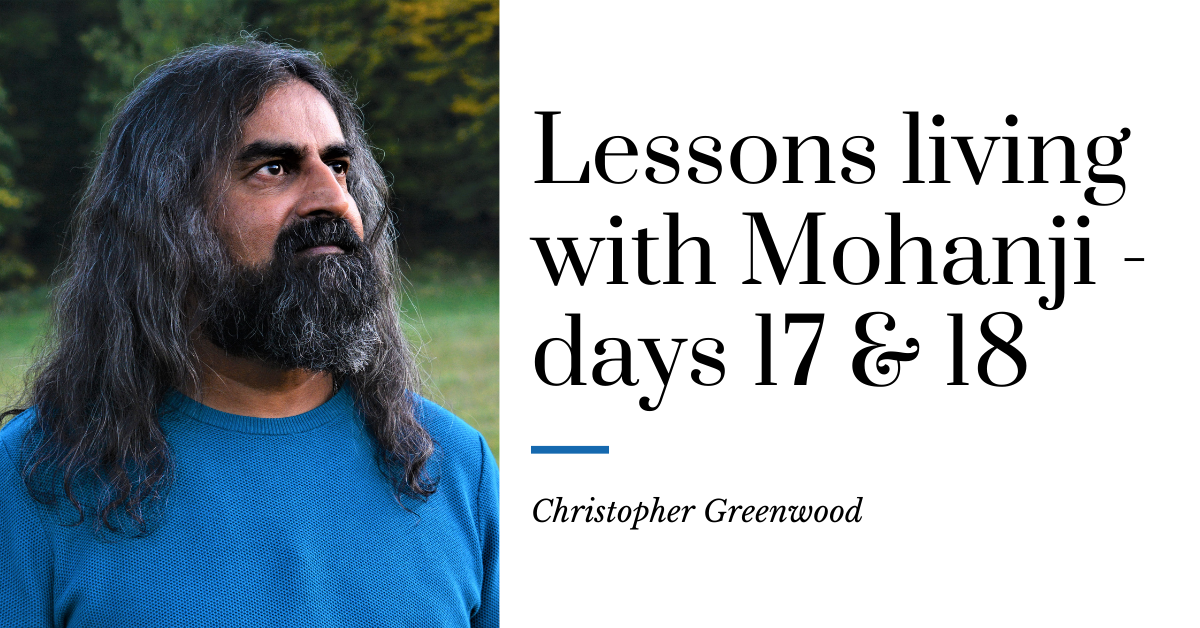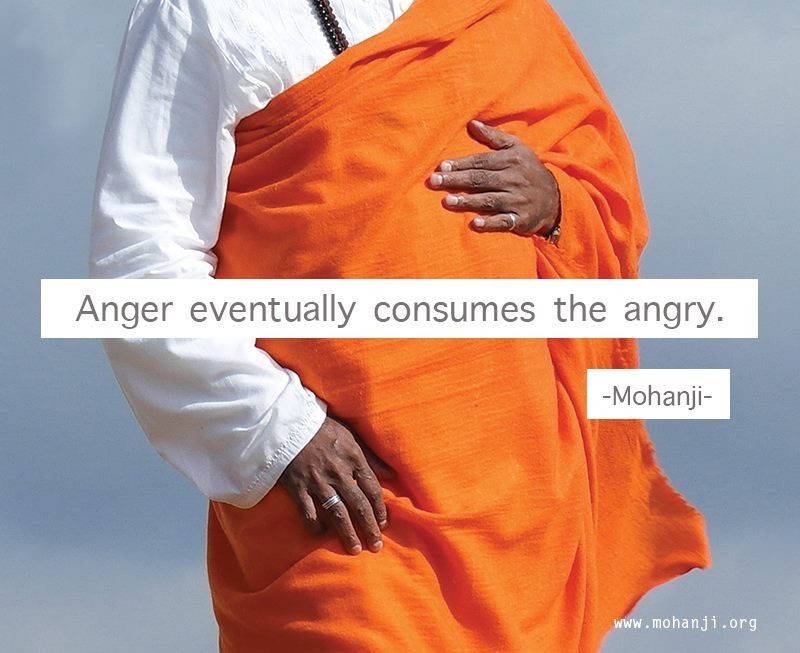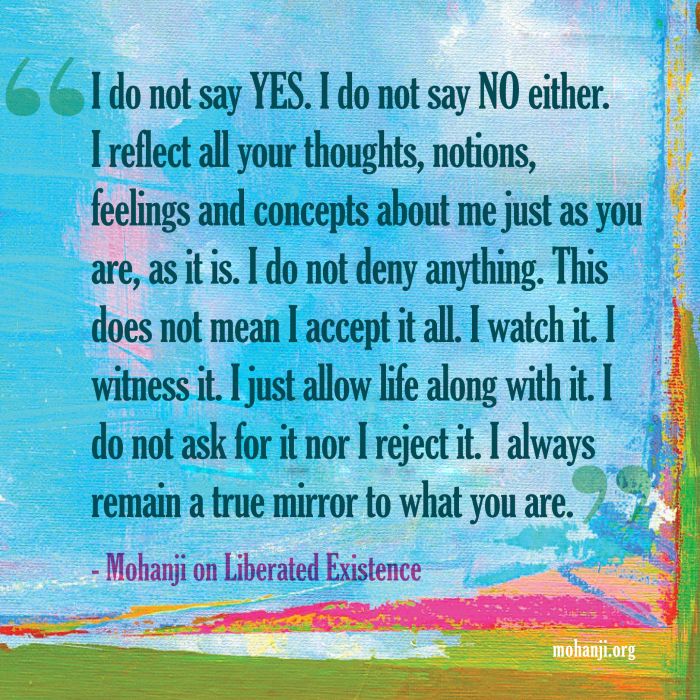by Christopher Greenwood
Day 17 Lesson – Intense expressions (which some see as scolding or anger)
Good morning, everybody.
Today, I wanted to talk about the intense expressions of Mohanji, which some people might consider to be scolding, as people close to Mohanji will have known and would have felt. And this came to mind today, and I thought to share my learnings from this, as some people might confuse these moments with anger. Mohanji has said, and other people have said it, it can be difficult to be with the master because there is unpredictability there.
In one discussion with Mohanji and others at the house, we spoke about other masters who have wilder methods with their disciples. Some of them scold, some abuse and some have even been known to beat their disciples. And, on the face of it, this can seem extreme or confuse people.
But what I’ve learned from reading, even from before meeting Mohanji, is that masters are always purpose-bound. Their job is to elevate people, so it’s never anger as such or scolding that comes from them. And masters, especially those within the Dattatreya tradition, have no boundaries. So they use many methods to get the job done.
For example, I don’t know if this master was from the Dattatreya tradition, but someone told me about a Master in the Himalayas who would actually throw rocks at people. And I think, so don’t quote me on this, that people would actually come to see him, and getting hit by one of these rocks was a blessing because it would take something away from them.
Mohanji also spoke about Gorkhe Guruji, who is a very famous Master with a ferocious reputation. Some of his disciples are really high flying serious businessmen in India, like the owners of massive corporations. And he abuses them completely when they go to see him, calls them crooks, cheats, everything. And they still go. But in that, he’s taking something from them. And Mohanji met him as well. And to the surprise of his disciples, he was completely honoured by Gorkhe Guruji because they thought he would receive the same treatment of being abused. But he was even asked to sit on his chair, which is a huge honour. I’ll talk about that in another recording.
But coming back to the point, when I hear stories like that, I’m thankful to be with Mohanji because he is incredibly kind, very patient, and caring. But there have definitely been times when I’ve been on the receiving end of a blast, as you can call it. It is incredibly uncomfortable, even gut-wrenching, very intense, and it’s like a visceral feeling that touches right to the core. It’s like recognition and nervousness in the stomach that something hasn’t been done quite well.
But what I’ve learned from these situations is that there’s always a purpose. And it’s not anger; it’s not scolding; it’s actually an intense expression. It’s an intensity of expression. And these expressions remove blockages. It might be that some negativity has developed, and depending on the size of the blockage, the level of intensity of the expression will rise accordingly. For example, if you had to move a boulder, you’d be using much more force than if you had to pick up and move a stone. So, it’s completely situation dependent. And also, once it’s happened, once something’s gone like a blast, or once this intensive expression is finished, there’s nothing further, there’s no lingering, there’s no coming back to it – it’s been, it’s gone, it’s done.
I’ve been with Mohanji now for quite a few months. And there’ve been a few times that I’ve experienced the range of this intense expression. And I know it’s always for a reason. And afterwards, I feel that something is transformed, something has been moved. And that’s a very big difference between someone being angry or someone scolding because that leaves a residue.
I think when someone scolds or they’re angry, it generally doesn’t leave a good feeling for the person on the receiving end or for the person doing it. So, you can sort of bucket these into two categories. One is when expectations are denied, which creates anger, and this is actually a weakness. And anger is always a weakness because it contaminates the person who’s angry. It stays with us; it disturbs our inside world, our system and leaves a residue. And then, there could be regrets and guilt, which can even affect self-esteem. Then the other, milder, category is when a mother out of care and consideration for a child might scold the child. So she displays anger and has a good intention, but this also can leave an impression.
I’ve observed and noticed that, when this situation comes, Mohanji’s reaction reflects my inner state. Depending on how I am, you can gauge the interaction; it’s almost like a good barometer. It’s a reflection back; it’s a mirror. So if I’m open, peaceful, and come with more awareness of the situation, then intensity is much less. Then it’s more of a conversation, a discussion of points for improvement or minor corrections.
But if, for some reason, I come to him with a defence, negativity, or even with ego or pride, then that’s a different story. And especially ego and pride, they definitely take a hit. Because in this situation here, the ego doesn’t really have a place. You know, we’re practising selflessness, humility. And so, to be egoistic and have a lot of pride, I don’t think it would be possible. And this is part of the daily practice of living with humility. As Mohanji says, “Man minus ego is equal to God.” So that’s the journey.
What I think and what I’ve learned is that these moments of intense expression are beneficial, actually, as a warning, as a guide, that I am maybe moving off track. And depending on how far you’re about to go off track or move in a certain direction, the intensity of that expression will rise to put you back on track. So, this intense expression is a guide, a help, and a prompt to come back to the right track and keep walking.
Today’s lesson was about the intense expressions of Mohanji and other masters, who do that for a purpose and not out of anger. I hope you have a great day ahead, and speak to you very soon.
Day 18 Lesson – Don’t let perfection be the enemy of progress. Act, learn from mistakes and grow.
Good morning, everybody.
Today, I share a lesson that continues on the general theme of ‘action first’ and moving activities forward. And it’s about making mistakes, learning and moving on.
Mohanji had shared many stories about mistakes that he’s made, the misfortunes and the serious events that affected his life—for example, losing his daughter Ammu and being betrayed in business. Then, he was completely character assassinated, too. But still, he kept walking. And even now, he regularly shares that he is not afraid to make mistakes, nor does he believe that his directions, ideas, or vision are always the best. In fact, he encourages me and others to have better ideas. He says, “If you can take my vision and improve on it, I’m very happy.”
That’s what he wants. And that’s the way he’s set up all the platforms, each of them with their country heads and teams, because he would love for everybody to take steps to improve everything because then the platforms have benefited, which means the world has benefited. And this also means that the future generations, who will come and inherit the platforms, will also benefit. So, each team has their head, and they are completely autonomous; they have their own free will to shape the direction within the broad boundaries of the vision. That is a real privilege.
So one lesson I’ve learned from Mohanji’s approach and how he works is to take action first, be bold, and do what you believe in as best as you can. If there’s a purity of intention behind it, then go for it. I had the tendency or the habit (probably due to the fears of making a mistake, being judged, and the fear of what other people might think) to make sure everything was fine and correct before taking action. So everything would have been perfected: the presentation had to be correct, everything well-considered, all options assessed, I’d look for advice or consultation from other people, etc. And in the end, not much would happen, only ideas and discussions.
So with strong encouragement, this was one of my pushes to take steps, to put ideas into action. Because only then, as I’ve learned now, do you create an experience for your life. Only when I’ve actually done something: have I created an experience for my life. And it’s only from having that experience that you can actually learn something and grow. But if you don’t do anything, don’t take the opportunity, then there’s no possibility for that growth to happen. And that can bring stagnation, frustration, and it can lead to disillusionment, which happened to me sometimes here.
I also learned that one of my biggest fears, the fear of making a mistake, was a fear of what other people might think. But, there’ll always be people who like an idea or something, and people who don’t, and then there’ll be some who probably won’t even care anyway. So that’s a fear that doesn’t really bring much worth.
The lesson is that it’s better to try and allow mistakes to happen and then use them for improvement. However, it’s not about making mistakes purposely, knowing that you’re going to make a mistake. It’s just about having the awareness that you don’t have to be perfect. Perfection isn’t needed because it can be the enemy of progress.
The same goes for consulting people and getting advice because sometimes, the more opinions we take from people, the more confused we can become. And with such a big organization like this, this is the case because there are many people who you would ideally like to consult and consider, but considering the time it would take, it’s just not practical.
So, I’ve learned that sometimes it’s better to move ahead and create something because it can be evolved, rather than spending too much time on discussions to reach a consensus. That isn’t practical, especially given the size and the breadth of this organization, which covers so many different countries and time zones. So, it’s better to generally have just a couple of people sanity check things with and then get moving.
Now, this doesn’t mean that work is done at the disrespect of other people or in spite of others, and moving things forward requires careful handling. Because, on the flip side, I’m also learning that fast action can cause unexpected consequences and mistakes when you’re moving so quickly that you lose sight of people and things. So again, as long as an issue can be marked as a mistake and improved upon, it’s okay.
This awareness, this learning that is moving into action and accepting mistakes will be happening, and improving them is bringing me more freedom. I can feel that. And when the purpose is higher, the fears lessen. And, most importantly, at the end of the day, it’s a life that’s been experienced.
So, I can express, make mistakes, know that that’s fine, learn and keep growing. It’s like the freedom we had when we were growing up as children, falling down and getting back up again.
That’s the message for today, sticking with that theme of acting now, acting today, and accepting that mistakes can happen and not letting perfection be an enemy of progress.
|| JAI BRAHMARISHI MOHANJI||
Edited & Published by – Testimonials Team, 25th April 2021
Discalimer:
The views, opinions, and positions expressed by the authors and those providing comments on these blogs are theirs alone and do not necessarily reflect the views, opinions or positions of Mohanji, Mohanji Foundation, it’s members, employees or any other individual or entity associated with Mohanji or Mohanji Foundation. We make no representations as to accuracy, completeness, timeliness, suitability or validity of any information presented by individual authors and/or commenters on our blogs and will not be liable for any errors, omissions, or delays in this information or any losses, injuries or damages arising from its display or use.
We reserve the right to delete, edit, or alter in any manner we see fit blog entries or comments that we, in our sole discretion, deem to be obscene, offensive, defamatory, threatening, in violation of trademark, copyright or other laws, of an express commercial nature, or otherwise unacceptable.
— Mohanji Testimonials Team








